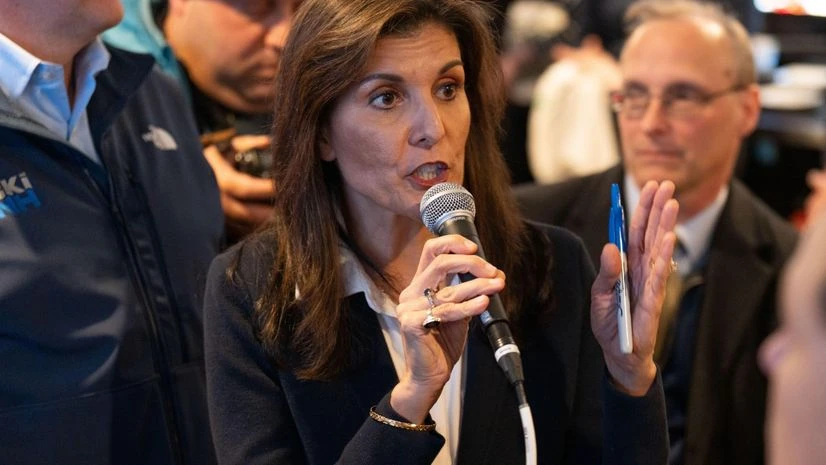Donald Trump's campaign plans to treat Nikki Haley as irrelevant after he won the Republican primary in her home state of South Carolina on Saturday, skipping attacks on her to focus instead on a rematch with Democratic President Joe Biden, advisers said.
The former president has easily swept all five Republican nominating contests thus far, winning states in the Midwest, Northeast, South and West and knocking out every challenger save Haley, a former South Carolina governor, along the way.
Saturday's win in South Carolina makes Trump's march towards the Republican presidential nomination appear inevitable, and leaves Haley, despite her vow to battle on, no clear path to beating him.
Trump advisers said they plan to ignore Haley in an effort to render her campaign an afterthought. That would mark a change in tactics by a campaign that has trained intense fire on her in recent weeks, with a barrage of vitriolic online attacks, pressure on her donors to switch to Trump and public mocking by the former president.
On the sidelines of a Trump event on Friday, campaign co-manager Chris LaCivita outlined the blueprint succinctly when asked about Haley.
"Nikki who?" LaCivita told Reuters.
More From This Section
Yet despite Trump's victory in South Carolina, there were some red flags for him in his likely general election rematch with Biden in November, when independent and moderate voters will play a crucial role in determining the winner.
Among self-described independent South Carolina voters, 6 out of 10 chose Haley, according to an exit poll conducted by Edison Research, which also showed her securing a slim majority of the white college-educated vote.
Republican strategist Chip Felkel, who has been critical of Trump, pointed to the fact that Haley garnered 40% of the votes on Saturday, to Trump's 60%, a narrower margin of victory for Trump than many had predicted.
Referring to November's presidential election, Felkel said he still expected Trump to be the nominee, but said there were warning signs for the general election.
"If the basis of the vote was mostly Republican, or independent, and he's not getting four out of 10 of those, I'd say Biden could use that," Felkel said.
HALEY VOWS TO PRESS AHEAD
For her part, Haley defiantly vowed to press on to Super Tuesday on March 5, when voters in 15 states and one U.S.
territory will deliver one-third of delegates to the Republican National Convention, which will choose a nominee in July.
"They have the right to a real choice, not a Soviet-style election with only one candidate," Haley told supporters on Saturday night after her defeat. "I have a duty to give them that choice."
Haley was due to travel to Michigan on Monday, where Republican nominating contests will be held on Feb. 27 and March 2. Her campaign released a video Sunday morning, called "The Fight Goes On."
Her campaign has released an aggressive schedule for the next several days, during which she will crisscross the country, from Massachusetts to Utah.
Haley had campaigned hard in South Carolina, the Southern state where she grew up and served as governor from 2011 to 2017. But Trump won by more than 20 percentage points, a margin wide enough that news outlets were able to call the race for him the minute that polls closed.
It remains to be seen whether Trump, who frequently goes off his teleprompter, can resist the urge to continue mocking Haley, against whom he has used language criticized as sexist and racist.
But Trump appeared to be following his advisers' strategy on Saturday. In a daytime address at the Conservative Political Action Conference, he did not say Haley's name once.
That evening, minutes after the polls closed, he delivered a victory speech that again did not include a single Haley mention - a sharp contrast to his remarks after winning New Hampshire in January, when he angrily decried her refusal to quit the race.
As part of its pivot to November's general election, the Trump campaign is going to focus on planning for the party's July convention, fundraising and effectively merging with the Republican National Committee, LaCivita and co-manager Susie Wiles said in a memo this week.
"Nikki Haley is irrelevant and not newsworthy," the memo said.
Trump surrogates, meanwhile, were not shy about voicing their opinion that Haley should drop out of the race so that Trump could focus on the presidential election on Nov. 5.
Representative Russell Fry of South Carolina, who was onstage with Trump as he gave his victory speech, said he considered the race over.
"This is a primary in name only," he told Reuters. "And I think the Haley campaign is continuing to spend money and resources that could be better directed towards securing the White House."
But some donors have continued to offer Haley financial backing, arguing that she is the only alternative if Trump's campaign derails.
He has pleaded not guilty to a slew of criminal charges and will face his first criminal trial next month in New York, where he is accused of falsifying business records to cover up an affair with a porn star.
"I think Nikki is the de facto backup for the GOP if something happens to Trump between now and the election," said one Haley donor, who asked to remain anonymous. "Probably a 2% chance, but if you are talking about being the leader of the free world, why not?"

)
